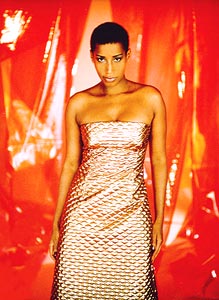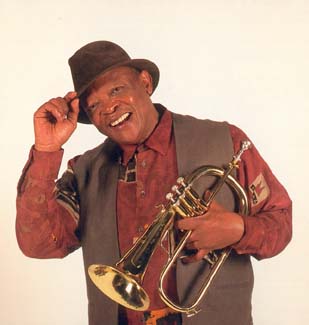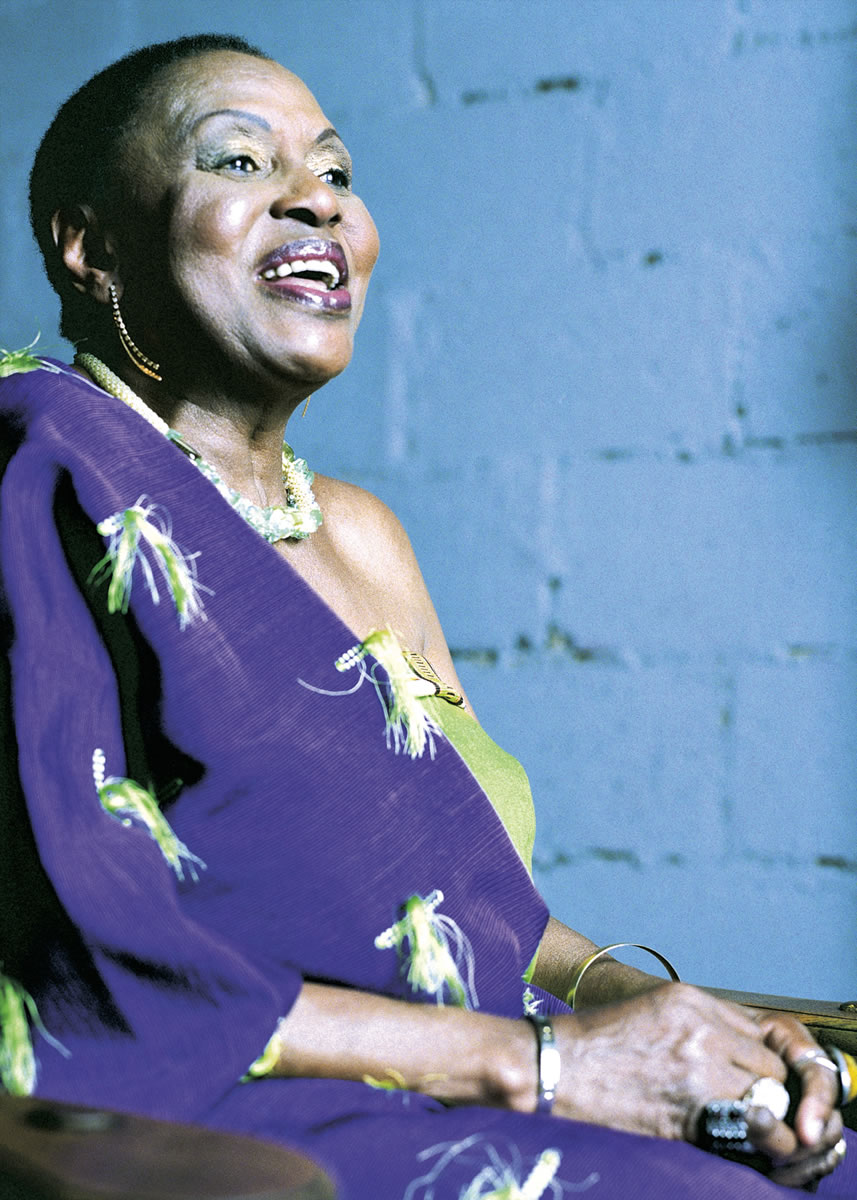DAÚDE / “Pata Pata”
The African element is natural to Brazilian music. It's expressed through rhythm and often directly in the singing style, vocalization and improvisation. It doesn’t need flourishes and vibrato. —DaúdeI never expected a Brazilian version of “Pata Pata”; hell, I never expected anyone outside of South Africa to cover that song. I mean Miriam Makeba’s “Pata Pata” seems to be one of those songs that would resist to the last note anybody coming up with a new twist, and yet, this Bahia-born, Rio-based popular Brazilian vocalist does it. From the heavy-drum opening to the exuberant and enticing lead vocal, this version is a bad mother-shut your mouth.
 Daúde, who goes by one name (her birth name is Maria Waldelurdes Costa de Santana), has a seductive playfulness about her that masks a willful, inquiring and courageous personality. Veteran London-based producer Will Mowatt (Soul II Soul) provides the slickness of sophisticated eclecticism to the mix, but also acknowledges that Daúde picked the songs and had definite ideas about how she wanted the material to sound, thus Makeba’s anthem now is projected as a ‘found’ song birthed in a Rio neighborhood (made all the more believable by the casual, stroll-down-the-street ambient soundscape over which Daude softly intones an acapella melody as a prelude before the drums drop). Brazilian co-producer Celso Fonseca, with his funky guitar skills and his broad musical knowledge, keeps the Brazil elements subtly prominent—for example, the berimbau touches in the opening of “Pata Pata.” And then there’s Carlinhos Brown (whose neighborhood Daúde shared as a youth). Brown’s distinctive voice is a powerful presence, sort of like hot chocolate dip coating a scoop of double-chocolate ice cream. Put it all together and you’ve got an irresistible jump up.
Daúde drops this township hit into a Rio favela and comes out with samba drum rhythms that are more African than Africa, perhaps because in longing for Africa there is an insistent emphasis that one does not have (nor need) when one is born in Africa; what is pushed down will often spring up stronger as a reaction to the downpress than it ever would push forward on its own.
—Kalamu ya Salaam
Click here to purchase Daude #2
Daúde, who goes by one name (her birth name is Maria Waldelurdes Costa de Santana), has a seductive playfulness about her that masks a willful, inquiring and courageous personality. Veteran London-based producer Will Mowatt (Soul II Soul) provides the slickness of sophisticated eclecticism to the mix, but also acknowledges that Daúde picked the songs and had definite ideas about how she wanted the material to sound, thus Makeba’s anthem now is projected as a ‘found’ song birthed in a Rio neighborhood (made all the more believable by the casual, stroll-down-the-street ambient soundscape over which Daude softly intones an acapella melody as a prelude before the drums drop). Brazilian co-producer Celso Fonseca, with his funky guitar skills and his broad musical knowledge, keeps the Brazil elements subtly prominent—for example, the berimbau touches in the opening of “Pata Pata.” And then there’s Carlinhos Brown (whose neighborhood Daúde shared as a youth). Brown’s distinctive voice is a powerful presence, sort of like hot chocolate dip coating a scoop of double-chocolate ice cream. Put it all together and you’ve got an irresistible jump up.
Daúde drops this township hit into a Rio favela and comes out with samba drum rhythms that are more African than Africa, perhaps because in longing for Africa there is an insistent emphasis that one does not have (nor need) when one is born in Africa; what is pushed down will often spring up stronger as a reaction to the downpress than it ever would push forward on its own.
—Kalamu ya Salaam
Click here to purchase Daude #2* * *
OK, it’s a week later and now that I've heard Mama Makeba's version of "Pata Pata," I like the Daude version even less. The original is a nice cut of spiritual yet breezy funk and more to the point has a samba-esque backbeat that would seem to lend itself to a Brazilian remake. I've heard a lot of good things about Daúde, but I ain't feeling the pop vibe.* * *
Now it’s been months since I’ve written the above and I actually like Daúde’s version. It’s probably because I’ve heard Miriam’s version enough to get to know it. Now, when I hear Daúde’s version, I hear a funky, banging Brazilian tribute to an African tribute to Brazil’s African influences. Follow? Cool. —Mtume ya Salaam You & Daúde got me thinking You got me thinking, I'm talking about the samba connection, not the pop thing. But first let me address the pop question. Although I'm no expert on Brazilian music, I have peeped it for a minute and I do read a lot of folks who claim to be experts, and the general consensus is that Daúde is the first Black (meaning dark skinned) female Brazilian pop music singer to make it big in Brazilian pop music (which they call ‘MPB,’ música popular Brasileira). This is straight-up a pop song. Though I really dig it, truth be told, “Pata Pata” is not my favorite Daúde track; there are about eight others I’m feeling more, so I feel you on not feeling it. At the same time, it's an important development, especially considering that the original was released in 1967 and this update is from 1997, thirty years later bringing it back. And now here comes the kicker, your comment about the Brazilian samba backbeat implicit in the original “Pata Pata” made me think. I started kicking myself for writing that silly line about who would have thought. I knew better. Why? Because there is a confluence between a lot of the South African music and Brazilian music. I have recordings with Airto and Flora Purim working with South African musicians. But even more important I have a Hugh Masekela LP, Colonial Man, which includes a cut that directly and explicitly refers to the samba being an import from Africa via the Portuguese slave trade. The title of the selection is (get to this!!!): “A Song For Brazil.” The album is a long-out-of-print vinyl LP recorded in 1976. So, as lagniappe, we post that cut.
I have recordings with Airto and Flora Purim working with South African musicians. But even more important I have a Hugh Masekela LP, Colonial Man, which includes a cut that directly and explicitly refers to the samba being an import from Africa via the Portuguese slave trade. The title of the selection is (get to this!!!): “A Song For Brazil.” The album is a long-out-of-print vinyl LP recorded in 1976. So, as lagniappe, we post that cut.
 Mtume, the more I think on it, the more I remember, and I’m asking myself how could I forget? You know where I first heard Brazilian music? On a Miriam Makeba record. She did Jorge Ben’s “Mas Que Nada.” Had me looking all over for more music with that kind of feel to it. Over the years she has beaucoup versions. Speaking of memory, I don’t even remember which version was the first version I heard in the late Sixties, so I’ll just include one of my favorite versions.
Damn, there are so many musical connections. Plus, this trivia note: Miriam Makeba and Hugh Masekela at one time were married during the early years of their careers. They both are very conscious musicians who spent many years in exile and thus, given both the quality and the quantity of their recordings / performances, musically they were both unavoidably influenced by and also influential upon cultural expression in the African diaspora.
And now, back to Daúde for a final second—working within the severe restrictions of pop music, our sister has thrown down a visual and verbal challenge.
Mtume, the more I think on it, the more I remember, and I’m asking myself how could I forget? You know where I first heard Brazilian music? On a Miriam Makeba record. She did Jorge Ben’s “Mas Que Nada.” Had me looking all over for more music with that kind of feel to it. Over the years she has beaucoup versions. Speaking of memory, I don’t even remember which version was the first version I heard in the late Sixties, so I’ll just include one of my favorite versions.
Damn, there are so many musical connections. Plus, this trivia note: Miriam Makeba and Hugh Masekela at one time were married during the early years of their careers. They both are very conscious musicians who spent many years in exile and thus, given both the quality and the quantity of their recordings / performances, musically they were both unavoidably influenced by and also influential upon cultural expression in the African diaspora.
And now, back to Daúde for a final second—working within the severe restrictions of pop music, our sister has thrown down a visual and verbal challenge.
 Her visual presence is decidedly anti-pop. She sports short hair; no girl from Ipanema (i.e. long-haired, beach bikini bunny), even though that is part and parcel of the popular image of Brazilian women.
Second her music is emphatic both in sound and lyrics, even when she is doing electronic dance music. Or, as one reviewer, Gustavo Arellano, writing about Neguinha Te Amo, her third release, says:
Her visual presence is decidedly anti-pop. She sports short hair; no girl from Ipanema (i.e. long-haired, beach bikini bunny), even though that is part and parcel of the popular image of Brazilian women.
Second her music is emphatic both in sound and lyrics, even when she is doing electronic dance music. Or, as one reviewer, Gustavo Arellano, writing about Neguinha Te Amo, her third release, says:
Daúde tames all the rhythms of Brazil into a coherent album on Neguinha Te Amo (Black Girl, I Love You), and still injects radical politics not seen in Brazilian pop music since the zenith of tropicalia in the late ‘60s. The singer’s third album sambas sensuously on the fine line between racial pride and overt prejudice with songs Beat-like in their abstract celebration of the Afro-Brazilian female. Such a focus might not seem particularly breathtaking in this Andre 3000 country, but to laud black beauty is verboten in Brazil, a nation that pretends race is irrelevant while conveniently overlooking its dark-hued citizens languishing in the favelas. So while lyrics such as "White boy, if you knew the true value of what it is to be black/You’d bathe in tar to become black as well" (on "Ile Aye") sound like a Nation of Islam sermon scored to infectious xylophones, Daude means it in the most empowering, non-racist of ways—besides, the way she wistfully coos the phrase in her melodious Brazilian Portuguese makes it as powerful a declaration of love as you’ll hear. More important, though, the racial politics of Neguinha te Amo is rhetorical dressing for the actual music, an ever-jiggling euphony of Brazilian instruments of every hoot and echo romping around electric organs, guitars and an icy-cool drum machine scaffold. Daude also borrows wonderfully from African-American neo-soul, especially on the dreamy, sexy "Sans Dire Adieu." Neguinha te Amo is black power at its most grooving.
From http://www.ocweekly.com/ink/04/10/cd-arellano.phpThird, this is still pop, not jazz, not ethnic music, not world music, not any of that, just Brazilian pop, and as such, it is a revolutionary development within its genre, regardless of how tame it may seem to us who are used to consuming everything as entertainment. So, yeah, Mtume, I understand your reluctance to embrace this in terms of what you like—indeed, part of me feels the same way you do about much of Daúde’s work—nevertheless, I salute our sister and promote our little sister Daúde struggling to be and get respect as a proud Black woman in a world (and I mean the whole wide world) where Black women are ceaselessly exploited and made to feel their worth is mainly in being somebody’s ‘mama,’ i.e. somebody’s primary nurturer or somebody’s sexual partner. And after much thought and re-consideration based on our conversation, I still like Daúde’s version of “Pata Pata.
* * *
Mtume, all of us have to learn "how to hear" music, espcially when we don't have the context for the source, the musical tradition, or the social contructs within which the music is produced and within which the music is primarily enjoyed. Daúde truly is a subversive force in pop music precisely because she is consciously (both artistically, but particularly politically) doing more than simply trying to be popular with a music-buying public.
—Kalamu ya Salaam
This entry was posted on Sunday, August 14th, 2005 at 12:03 am and is filed under Cover. You can follow any responses to this entry through the RSS 2.0 feed. You can leave a response, or trackback from your own site.
2 Responses to “DAÚDE / “Pata Pata””
August 17th, 2005 at 8:42 pm
I just happen to have a wax LP copy of Hugh Masekela’s COLONIAL MAN. It is one of my favorite albums of all times. And I have not heard “A Song for Brazil” in years. I no longer have a turntable. Thanks for playing it.
That was a real treat. There are six songs (pieces) on the album: Side One — “A Song for Brazil,” “Vasco Da Gama,” and “For the Love of You”; Side Two — “Colonial Man,” “Witch Doctor,” and “Cecil Rhodes.”
If there was ever a perfect album, COLONIAL MAN is it. Another nice thing about the LP cover is that instead of liner notes, the words to the songs are provided.
I have no idea whether the album is now on CD. In any event, it does not seem that amazon.com carries it.
Rudy
March 12th, 2015 at 11:29 am
You are so cool! I do not think I have read through a single thing like that before.
So nice to discover another person with a few genuine thoughts on this topic.
Seriously.. many thanks for starting this up. This website is something that is needed on the web, someone with a little originality!
Leave a Reply
| top |